Kathleen Jones's Blog, page 7
June 11, 2018
All the fun of the (horse) fair!
It's Appleby Horse Fair week when gypsies from all over the UK, Ireland and northern Europe converge on our small town. A quiet country place becomes more like the Wild West. Living in an old mill on the river bank we see more of it than anyone else. It's a wide, tranquil river stretch to wash and run horses in; the weir is a good swimming place and the ford provides a bit of excitement. The ford gets used a lot because horses are banned in town and it becomes the only way to come and go from the road on the other side. Our driveway is crammed with horse-boxes, the river bank a parking place for gigs and horses. It's difficult to get in and out so we stay in as much as possible. We see some beautiful horses. Here's a slide show of some of the highlights, and a bit of the downside.
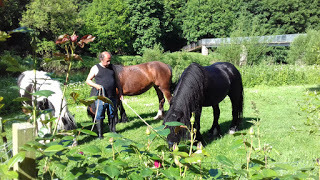 Breakfast with horses and a friendly Romany.
Breakfast with horses and a friendly Romany.
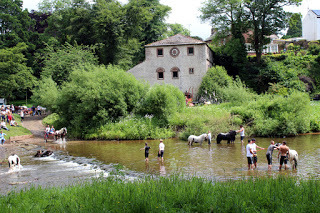 Our house by mid-morning.
Our house by mid-morning.
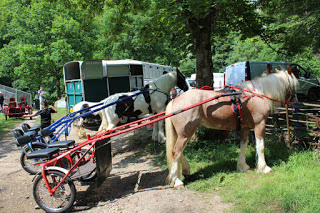 The front Gate
The front Gate
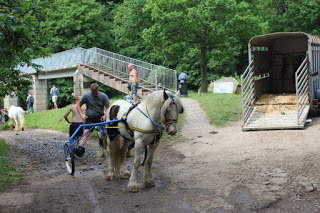 Out of the box and ready to run!
Out of the box and ready to run!
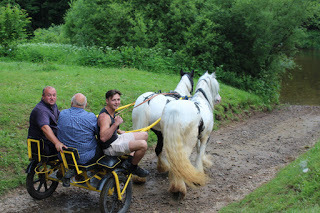 Attitude! And two beautiful horses.
Attitude! And two beautiful horses.
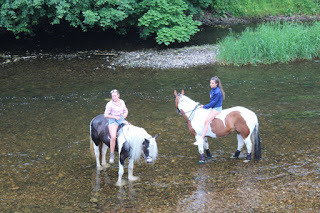 The girls have fun too.
The girls have fun too.
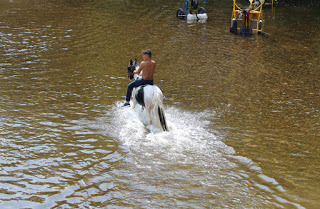 Bareback in the early morning.
Bareback in the early morning.
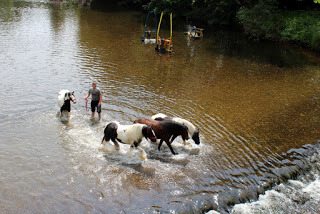 3 Brothers escaping downstream! They were faster than their owner.
3 Brothers escaping downstream! They were faster than their owner.
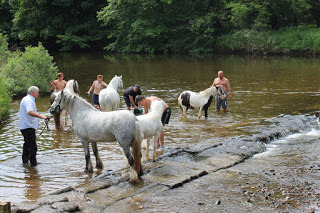
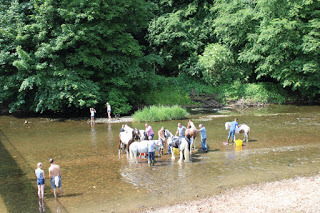 A river full of horses.
A river full of horses.
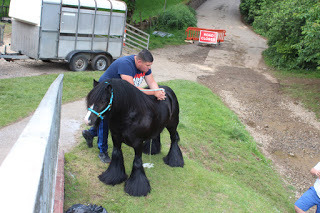 Taking a piss as I clicked the shutter! Beautiful small stallion.
Taking a piss as I clicked the shutter! Beautiful small stallion.
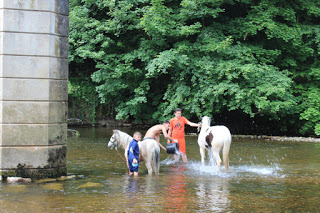 The big and the small under the bridge.
The big and the small under the bridge.
But there is a significant minority of owners who do not treat their animals properly. We see an increasing amount of cruelty and neglect. Yesterday we saw a mare tied to our garden fence, panting and exhausted. She was wearing cuffs to hobble her back legs and looked in pain. But one of the 68 RSPCA officers based here was following the horse accompanied by a vet. There was a long altercation with the young man who owned the horse who kept insisting there was nothing wrong with her despite the fact that she looked about to drop dead.
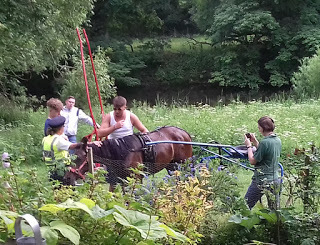 The scene from our garden. The vet is in green.
The scene from our garden. The vet is in green.
They made him take off the harness and the gig and take her into the river to sluice her with cold water and let her drink. There was an examination that revealed other problems - sores, a swollen hip joint among other things. The horse was confiscated by the RSPCA (you can imagine how popular that was) and horse and owner were taken to the police station.
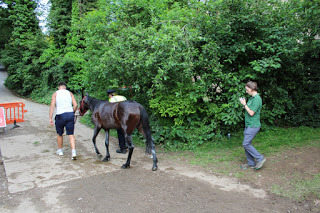
But it's over now for another year and we can all get on with normal life - not to mention being able to get out of the front gate without a police escort!
 Breakfast with horses and a friendly Romany.
Breakfast with horses and a friendly Romany. Our house by mid-morning.
Our house by mid-morning.
 The front Gate
The front Gate
 Out of the box and ready to run!
Out of the box and ready to run! Attitude! And two beautiful horses.
Attitude! And two beautiful horses. The girls have fun too.
The girls have fun too. Bareback in the early morning.
Bareback in the early morning. 3 Brothers escaping downstream! They were faster than their owner.
3 Brothers escaping downstream! They were faster than their owner.
 A river full of horses.
A river full of horses.
 Taking a piss as I clicked the shutter! Beautiful small stallion.
Taking a piss as I clicked the shutter! Beautiful small stallion.
 The big and the small under the bridge.
The big and the small under the bridge.But there is a significant minority of owners who do not treat their animals properly. We see an increasing amount of cruelty and neglect. Yesterday we saw a mare tied to our garden fence, panting and exhausted. She was wearing cuffs to hobble her back legs and looked in pain. But one of the 68 RSPCA officers based here was following the horse accompanied by a vet. There was a long altercation with the young man who owned the horse who kept insisting there was nothing wrong with her despite the fact that she looked about to drop dead.
 The scene from our garden. The vet is in green.
The scene from our garden. The vet is in green.They made him take off the harness and the gig and take her into the river to sluice her with cold water and let her drink. There was an examination that revealed other problems - sores, a swollen hip joint among other things. The horse was confiscated by the RSPCA (you can imagine how popular that was) and horse and owner were taken to the police station.

But it's over now for another year and we can all get on with normal life - not to mention being able to get out of the front gate without a police escort!
Published on June 11, 2018 12:47
June 5, 2018
Tuesday Poem: Morning in the Burned House, Margaret Atwood
A Fire Place
Here is the place where the lightning fire one time
almost got us. Where the heroic youngish
(now dead) men in their chequered flannel
shirts with the sleeves rolled up and their high-laced
lumberjacks' (obsolete) boots once fought it
with hand-pumps and axes to a damp and acrid
standstill. Where the charred trunks lay smouldering.
The whole thing a gash (they said) in the forest. A scar.
Where then poplar seeped in and over, feeding on ashes, and (purple)
fireweed, and (blue) berries, and the bears, and us
with our lard pails and tin cups, our jelly
sandwiches at lunchtime, skinning our knees on the sooty
rocks, smudging our hands
and mouths with black and blue, in our summer clothing (since
torn into dustcloths, thrown out and rotted away).
Now that bright random clearing
or burn, or meadow if you like, is gone
also, and there's scrubland, a light-green
sticky new forest. Earth does such things
to itself: furrowing, cracking apart, bursting
into flame. It rips openings in itself, which it struggles
(or not) to skin over. The moon
doesn't care about its own
craters and bruises. Only we can regret
the perishing of the burned place.
Only we could call it a wound.
Copyright Margaret Atwood
Morning in the Burned House, Houghton Mifflin Co., 1995
This is my favourite collection from Margaret Atwood. It's elegiac, thoughtful and profound. It contains a long sequence for her dying father, in which she addresses the past and her own 'fall into the future' of old age and eventual death. One review identifies a 'vein of grieving that moves through this book like a dark tracer'. The grief is not only for the poet's father. There is, also, in this book an awareness of the losses suffered in the natural world - Margaret Atwood, like many Canadians, is a committed environmentalist.

Most people know Margaret Atwood only as a best-selling novelist, but she is a wonderful poet with eleven collections published - all of them amazing.
I've recently been reading the Canadian crime series of Inspector Gamache novels by Louise Penny. In them she puts Atwood's words (with permission) into the mouth of a crazy, politically incorrect, embittered old poet called Ruth Zardo who has a pet duck and drinks other people's whisky. It was quite strange finding the poems from Morning in the Burned House in this context. Astonishing! Who knows? Perhaps we'll find Val McDermid quoting Carol Anne Duffy in some of hers?
Morning in the Burned House
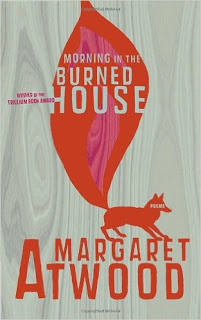
Here is the place where the lightning fire one time
almost got us. Where the heroic youngish
(now dead) men in their chequered flannel
shirts with the sleeves rolled up and their high-laced
lumberjacks' (obsolete) boots once fought it
with hand-pumps and axes to a damp and acrid
standstill. Where the charred trunks lay smouldering.
The whole thing a gash (they said) in the forest. A scar.
Where then poplar seeped in and over, feeding on ashes, and (purple)
fireweed, and (blue) berries, and the bears, and us
with our lard pails and tin cups, our jelly
sandwiches at lunchtime, skinning our knees on the sooty
rocks, smudging our hands
and mouths with black and blue, in our summer clothing (since
torn into dustcloths, thrown out and rotted away).
Now that bright random clearing
or burn, or meadow if you like, is gone
also, and there's scrubland, a light-green
sticky new forest. Earth does such things
to itself: furrowing, cracking apart, bursting
into flame. It rips openings in itself, which it struggles
(or not) to skin over. The moon
doesn't care about its own
craters and bruises. Only we can regret
the perishing of the burned place.
Only we could call it a wound.
Copyright Margaret Atwood
Morning in the Burned House, Houghton Mifflin Co., 1995
This is my favourite collection from Margaret Atwood. It's elegiac, thoughtful and profound. It contains a long sequence for her dying father, in which she addresses the past and her own 'fall into the future' of old age and eventual death. One review identifies a 'vein of grieving that moves through this book like a dark tracer'. The grief is not only for the poet's father. There is, also, in this book an awareness of the losses suffered in the natural world - Margaret Atwood, like many Canadians, is a committed environmentalist.

Most people know Margaret Atwood only as a best-selling novelist, but she is a wonderful poet with eleven collections published - all of them amazing.
I've recently been reading the Canadian crime series of Inspector Gamache novels by Louise Penny. In them she puts Atwood's words (with permission) into the mouth of a crazy, politically incorrect, embittered old poet called Ruth Zardo who has a pet duck and drinks other people's whisky. It was quite strange finding the poems from Morning in the Burned House in this context. Astonishing! Who knows? Perhaps we'll find Val McDermid quoting Carol Anne Duffy in some of hers?
Morning in the Burned House

Published on June 05, 2018 02:34
May 14, 2018
Back to ?Reality - Leaving NZ
It's amazing how soon things become just a memory and you're so firmly back in place you wonder if any of it was real! It was hard coming back from New Zealand - hard to leave family not knowing how long it might be before I can see them again - hard to come back to the daily grind after such a wonderful, relaxing holiday. One month of lazing about, eating wonderful food cooked by someone else, sitting in the garden, walking, browsing the shops, doing ordinary stuff and talking to my daughter and grandchildren. Two long flights - the first about 10.5 hours, the second 13.5 with a lot of hanging about in Singapore in between, really took their toll, especially when you're feeling down. But I'm left with some wonderful memories. New Zealand skies are some of the most amazing I've ever seen anywhere in the world. Here's one of them:
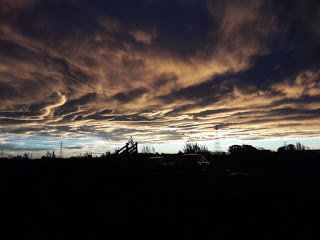 Evening sky over the Canterbury Plain
Evening sky over the Canterbury Plain
And the scenery is so wild and wonderful. You can walk for hours and not see anyone.
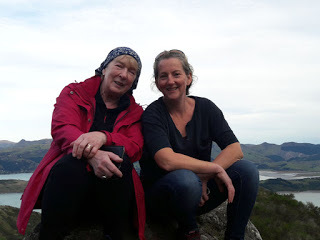 Mother and daughter walking in the Port Hills.
Mother and daughter walking in the Port Hills.
And I'll miss the recycling culture!
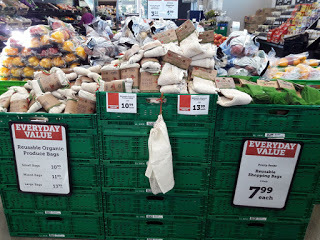 No excuse to refuse a plastic bag! Christchurch city is still a building site, so many years after the series of earthquakes that leveled it. But how do you build a city from scratch? There are lots of new restaurants and office blocks (none more than 8 stories high) and a few smart shops opening, but there are still acres of empty plots and most of the old historic buildings are still propped up and cordoned off awaiting restoration. I miss the diversity of the original city centre, though the futuristic new one rising out of the rubble is going to be spectacular.
No excuse to refuse a plastic bag! Christchurch city is still a building site, so many years after the series of earthquakes that leveled it. But how do you build a city from scratch? There are lots of new restaurants and office blocks (none more than 8 stories high) and a few smart shops opening, but there are still acres of empty plots and most of the old historic buildings are still propped up and cordoned off awaiting restoration. I miss the diversity of the original city centre, though the futuristic new one rising out of the rubble is going to be spectacular.
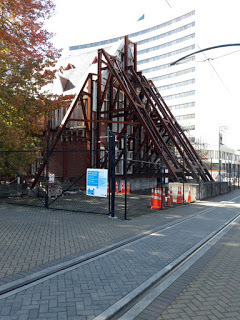

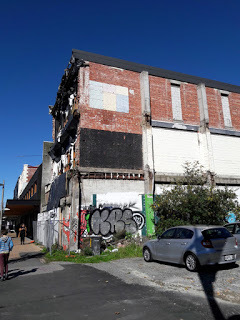
Meanwhile, back home to ordinary life and a mountain of work. It all feels a bit surreal (jet-lag?) and, just to prove that it is, The Girl has been dyeing her hair and I now have a purple bathroom!! But, on the plus side, the sun is shining and my magnolia is in full bloom.
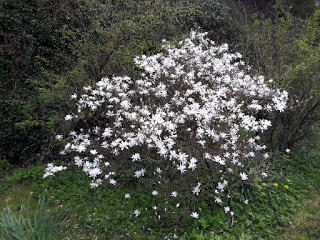
 Evening sky over the Canterbury Plain
Evening sky over the Canterbury PlainAnd the scenery is so wild and wonderful. You can walk for hours and not see anyone.
 Mother and daughter walking in the Port Hills.
Mother and daughter walking in the Port Hills.And I'll miss the recycling culture!
 No excuse to refuse a plastic bag! Christchurch city is still a building site, so many years after the series of earthquakes that leveled it. But how do you build a city from scratch? There are lots of new restaurants and office blocks (none more than 8 stories high) and a few smart shops opening, but there are still acres of empty plots and most of the old historic buildings are still propped up and cordoned off awaiting restoration. I miss the diversity of the original city centre, though the futuristic new one rising out of the rubble is going to be spectacular.
No excuse to refuse a plastic bag! Christchurch city is still a building site, so many years after the series of earthquakes that leveled it. But how do you build a city from scratch? There are lots of new restaurants and office blocks (none more than 8 stories high) and a few smart shops opening, but there are still acres of empty plots and most of the old historic buildings are still propped up and cordoned off awaiting restoration. I miss the diversity of the original city centre, though the futuristic new one rising out of the rubble is going to be spectacular.


Meanwhile, back home to ordinary life and a mountain of work. It all feels a bit surreal (jet-lag?) and, just to prove that it is, The Girl has been dyeing her hair and I now have a purple bathroom!! But, on the plus side, the sun is shining and my magnolia is in full bloom.

Published on May 14, 2018 10:05
May 1, 2018
Life-changing Books - and unintended consequences!
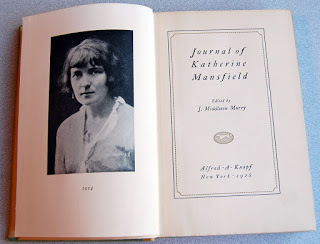
Picking up Katherine Mansfield's journal in a second-hand book bin changed my life, taking me all the way to New Zealand! And there were consequences for my family too. Want to know what happened?
Royal Literary Fund Vox - https://www.rlf.org.uk/showcase/kathleen-jones-lcl/
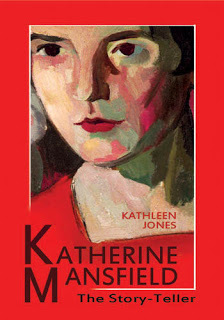
Published on May 01, 2018 08:29
April 26, 2018
The Mystery of the Disappearing Eggs
I've been staying in New Zealand on my daughter's small 'Life-style block' near Christchurch. In the UK it would be called a small-holding. There's an orchard, an organic garden, paddocks containing two cows and a patch of woodland where chickens and ducks roam free inside a wire 'chicken prison'.
Farming is a thankless business. My father always maintained that livestock had an intrinsic death wish from the moment they were born and his entire life was devoted to keeping them alive against an army of predators, diseases, the weather and that inbred lack of the will to live.
My daughter Meredith has a similar struggle on the plains of Canterbury. Chickens and ducks are a particular problem. One morning when I was there a duck was found mysteriously drowned in the paddling pool (6 inches deep and about 2 feet across!) . Hen harriers circle the air above the chicken run hoping to get lucky. Another morning one of the small pullets was found to be missing - only a heap of feathers, two feet and a beak remained. Hedgehogs are also a pest in New Zealand and chicks have to survive their predation as well as the appetites of cannabalistic siblings, who are not averse to snaffling any unwatched chick.
But the hens have always laid well - that is until recently. For weeks there hasn't been a single egg. This is so unusual there just had to be a cause. Everything else ruled out, something had to be stealing the eggs. Hedgehogs? They tend to eat the eggs where they find them and leave mess. The eggs were simply vanishing. Rats? New rat bait went untouched. Who was the egg thief?
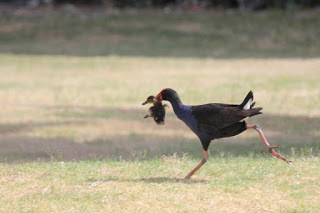
Meet Pukeko, one of New Zealand's native birds. They are marsh chickens - quite large with very long legs. They run well, fly well and apparently have very adventurous appetites.
Meredith's small paddocks have always had visiting Pukekos attracted by the insects around the cattle and the green salads in her garden. They have a distinctive shriek in the mornings and are very entertaining to watch.
But it was a big surprise the other morning, patrolling the woodland to feed the chooks, to find a Pukeko in the chicken house, where it has apparently been living for some time. Online research told us that Pukekos are egg thieves and will also eat chicks and ducklings. Everything became clear!
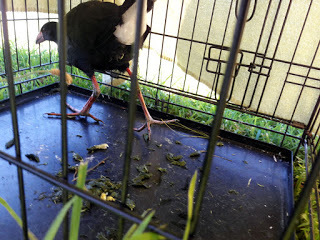 The egg thief unmasked.
The egg thief unmasked.
The intruder was quickly shooed out of the chicken house into a metal crate and taken to the nearest wet-land to be released.
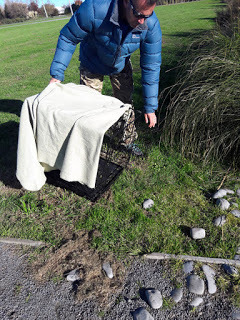 Going, going - gone!
Going, going - gone!
Hopefully the chickens will start laying again!
Farming is a thankless business. My father always maintained that livestock had an intrinsic death wish from the moment they were born and his entire life was devoted to keeping them alive against an army of predators, diseases, the weather and that inbred lack of the will to live.
My daughter Meredith has a similar struggle on the plains of Canterbury. Chickens and ducks are a particular problem. One morning when I was there a duck was found mysteriously drowned in the paddling pool (6 inches deep and about 2 feet across!) . Hen harriers circle the air above the chicken run hoping to get lucky. Another morning one of the small pullets was found to be missing - only a heap of feathers, two feet and a beak remained. Hedgehogs are also a pest in New Zealand and chicks have to survive their predation as well as the appetites of cannabalistic siblings, who are not averse to snaffling any unwatched chick.
But the hens have always laid well - that is until recently. For weeks there hasn't been a single egg. This is so unusual there just had to be a cause. Everything else ruled out, something had to be stealing the eggs. Hedgehogs? They tend to eat the eggs where they find them and leave mess. The eggs were simply vanishing. Rats? New rat bait went untouched. Who was the egg thief?

Meet Pukeko, one of New Zealand's native birds. They are marsh chickens - quite large with very long legs. They run well, fly well and apparently have very adventurous appetites.
Meredith's small paddocks have always had visiting Pukekos attracted by the insects around the cattle and the green salads in her garden. They have a distinctive shriek in the mornings and are very entertaining to watch.
But it was a big surprise the other morning, patrolling the woodland to feed the chooks, to find a Pukeko in the chicken house, where it has apparently been living for some time. Online research told us that Pukekos are egg thieves and will also eat chicks and ducklings. Everything became clear!
 The egg thief unmasked.
The egg thief unmasked.The intruder was quickly shooed out of the chicken house into a metal crate and taken to the nearest wet-land to be released.
 Going, going - gone!
Going, going - gone!Hopefully the chickens will start laying again!
Published on April 26, 2018 08:16
April 22, 2018
A Strange, Beautiful Excitement, by Redmer Yska
Being back in New Zealand always brings me face to face with Katherine Mansfield. I'm haunted by her, both as a writer and as a person and anything new that is published about her I read avidly. I've known about Redmer Yska's research for this book from the beginning and I've waited with great excitement for its publication.
The book itself is a thing of beauty, with the inside cover lined with James M. Nairn’s painting of Wellington harbour in full colour c.1894.
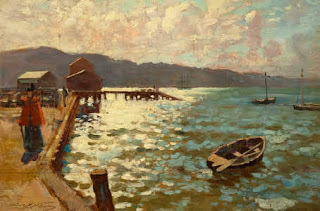
Redmer Yska’s narrative is an evocative account of Katherine Mansfield’s childhood and the history of her family in New Zealand. The characters are drawn vividly from their letters and journals, from family anecdotes and a meticulous trawl through New Zealand’s archival records.
Shameful family secrets, such as the two bankruptcies of Katherine’s grandfather are revealed, and possible motives for her mother’s marriage to a man she often tolerated rather than passionately loved. By marrying Harold Beauchamp, Annie Dyer secured a home for herself, her sisters and widowed mother.
But at the heart of the book is Katherine’s relationship with Karori – a place she would idealise and recreate in stories like The Aloe and The Doll’s House. Redmer Yska shows us the real people who appeared in Katherine’s New Zealand stories – often under their own names, like Pat Sheehan the handyman, and Lily and little Else Kelvie (McElvy) or ole Underwood. Being a native of Karori himself, Redmer can supply the kind of details of their lives that only someone who knows their descendants can give.
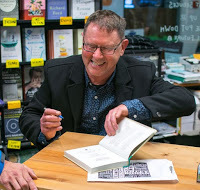 Redmer Yska at a book signing in NZ
Redmer Yska at a book signing in NZ
Redmer uncovers bitter family rivalry between Katherine and her older sister Vera over school prizes (2 writing prizes coveted by KM were won by Vera). He also gives a detailed, and original, account of the cholera epidemic that broke out in Wellington, thought to have killed Katherine’s baby sister Gwen and Redmer provides evidence that this event caused Harold Beauchamp to move the family out of town into the country. The move to Karori is the setting for Mansfield's most famous story ‘Prelude’. This is original research by Redmer Yska, and in the course of it he uncovered a new, previously unknown story by Katherine Mansfield, published in a local paper before she left New Zealand. It's called 'His Little Friend', and it's about a 'lonely, elderly man and an impoverished child'.
Most of Katherine Mansfield's biographers (including myself) have been British and this has undoubtedly influenced their approach to her life. Redmer Yska is a New Zealander. He points out that Katherine spent half her life living in New Zealand and the other half writing about it. He says; "I have tried to bring her back home, underline her physical presence. I show her as a vigorous youngster striding through the gale, long curly hair flying. I’ve tried to find the ‘human story’ of her adolescence, her living footsteps. I’ve tried to catch a glimpse of her in the open air, to make her live, move, talk.” That he succeeded is shown in the glowing reviews from other New Zealand authors. Fiona Kidman wrote that it is 'a ravishing, immersive read'. For Kirsty Gunn it is 'a literary study of riveting depth and focus'.
This is a beautifully illustrated and very readable book that provides a vivid context for Katherine Mansfield’s early life and the settings of her stories. You can breathe New Zealand as you read it.
A Strange Beautiful Excitement
Redmer Yska
Otago University Press
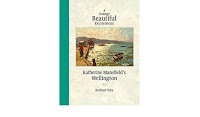
If you're interested in Katherine Mansfield's childhood in New Zealand then you might also like to read Gerri Kimber's 'Katherine Mansfield: The Early Years ', published by Edinburgh University Press. And then there is my own biography, 'Katherine Mansfield: The Storyteller' , also published by EUP.
The book itself is a thing of beauty, with the inside cover lined with James M. Nairn’s painting of Wellington harbour in full colour c.1894.

Redmer Yska’s narrative is an evocative account of Katherine Mansfield’s childhood and the history of her family in New Zealand. The characters are drawn vividly from their letters and journals, from family anecdotes and a meticulous trawl through New Zealand’s archival records.
Shameful family secrets, such as the two bankruptcies of Katherine’s grandfather are revealed, and possible motives for her mother’s marriage to a man she often tolerated rather than passionately loved. By marrying Harold Beauchamp, Annie Dyer secured a home for herself, her sisters and widowed mother.
But at the heart of the book is Katherine’s relationship with Karori – a place she would idealise and recreate in stories like The Aloe and The Doll’s House. Redmer Yska shows us the real people who appeared in Katherine’s New Zealand stories – often under their own names, like Pat Sheehan the handyman, and Lily and little Else Kelvie (McElvy) or ole Underwood. Being a native of Karori himself, Redmer can supply the kind of details of their lives that only someone who knows their descendants can give.
 Redmer Yska at a book signing in NZ
Redmer Yska at a book signing in NZRedmer uncovers bitter family rivalry between Katherine and her older sister Vera over school prizes (2 writing prizes coveted by KM were won by Vera). He also gives a detailed, and original, account of the cholera epidemic that broke out in Wellington, thought to have killed Katherine’s baby sister Gwen and Redmer provides evidence that this event caused Harold Beauchamp to move the family out of town into the country. The move to Karori is the setting for Mansfield's most famous story ‘Prelude’. This is original research by Redmer Yska, and in the course of it he uncovered a new, previously unknown story by Katherine Mansfield, published in a local paper before she left New Zealand. It's called 'His Little Friend', and it's about a 'lonely, elderly man and an impoverished child'.
Most of Katherine Mansfield's biographers (including myself) have been British and this has undoubtedly influenced their approach to her life. Redmer Yska is a New Zealander. He points out that Katherine spent half her life living in New Zealand and the other half writing about it. He says; "I have tried to bring her back home, underline her physical presence. I show her as a vigorous youngster striding through the gale, long curly hair flying. I’ve tried to find the ‘human story’ of her adolescence, her living footsteps. I’ve tried to catch a glimpse of her in the open air, to make her live, move, talk.” That he succeeded is shown in the glowing reviews from other New Zealand authors. Fiona Kidman wrote that it is 'a ravishing, immersive read'. For Kirsty Gunn it is 'a literary study of riveting depth and focus'.
This is a beautifully illustrated and very readable book that provides a vivid context for Katherine Mansfield’s early life and the settings of her stories. You can breathe New Zealand as you read it.
A Strange Beautiful Excitement
Redmer Yska
Otago University Press

If you're interested in Katherine Mansfield's childhood in New Zealand then you might also like to read Gerri Kimber's 'Katherine Mansfield: The Early Years ', published by Edinburgh University Press. And then there is my own biography, 'Katherine Mansfield: The Storyteller' , also published by EUP.
Published on April 22, 2018 21:50
April 19, 2018
Windy, Windy Wellington
I decided to spend a few days in Wellington just as a category 2 tropical cyclone decided to swoop across North Island! I travelled up to the ferry by coach because the train still isn't running after the Kaikoura earthquake in December 2016. The road (bit of a euphemism here!) has only been open since Christmas and is closed at night because it's still under construction. In some places only one half of the road is there - the rest has plunged into the gorge. The scale of the problem is vast - kilometres of road were buried when whole mountainsides slid down during the earthquake.
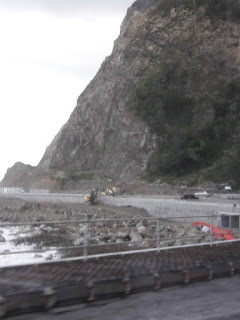 One of the landslide sites under construction near KaikouraNow the road has been bulldozed out from underneath millions of tons (I'm not exaggerating) of rock and earth and is being reconstructed. Whole sections - totalling about 100 km - are being built from scratch. It's a mammoth undertaking. The mountainsides are being stabilised, but big containers are stacked up to protect road users from falling rock until it's finished.
One of the landslide sites under construction near KaikouraNow the road has been bulldozed out from underneath millions of tons (I'm not exaggerating) of rock and earth and is being reconstructed. Whole sections - totalling about 100 km - are being built from scratch. It's a mammoth undertaking. The mountainsides are being stabilised, but big containers are stacked up to protect road users from falling rock until it's finished.
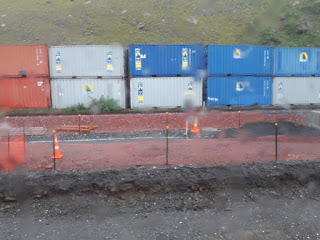 Containers stacked along the unfinished road. The remains of the old road can be seen just behind the fence.Out to sea the seabed has been raised by almost 15 feet in places and you can see the different colours of the rocks. The cyclone was already beginning to lash down with rain as I travelled, so it was almost impossible to take photographs through bus windows streaked with rain, but I did my best!
Containers stacked along the unfinished road. The remains of the old road can be seen just behind the fence.Out to sea the seabed has been raised by almost 15 feet in places and you can see the different colours of the rocks. The cyclone was already beginning to lash down with rain as I travelled, so it was almost impossible to take photographs through bus windows streaked with rain, but I did my best!
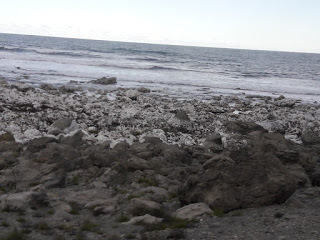 The white rocks are newly exposed - it's a lot further to the sea these days.In Wellington, although I'm used to Southerly Busters, the wind and rain were something else. I got blown over once and soaked to the skin twice. All plans were abandoned - instead of walking the Katherine Mansfield trail I dodged in and out of coffee shops and museums. I met up with New Zealand author Redmer Yska who has just published a beautiful book on Wellington in the days when Katherine Mansfield's family were settling there. It's called 'A Strange, Beautiful Excitement' and captures the atmosphere of a newly established colonial capital perfectly - the snobbery, the corruption, the risk-taking and the stifling lives of middle class colonial wives; everything in fact that Katherine Mansfield wanted to escape from. Redmer is himself from Karori and describes the school that Katherine went to and the village, both now and then. He makes New Zealand live.
The white rocks are newly exposed - it's a lot further to the sea these days.In Wellington, although I'm used to Southerly Busters, the wind and rain were something else. I got blown over once and soaked to the skin twice. All plans were abandoned - instead of walking the Katherine Mansfield trail I dodged in and out of coffee shops and museums. I met up with New Zealand author Redmer Yska who has just published a beautiful book on Wellington in the days when Katherine Mansfield's family were settling there. It's called 'A Strange, Beautiful Excitement' and captures the atmosphere of a newly established colonial capital perfectly - the snobbery, the corruption, the risk-taking and the stifling lives of middle class colonial wives; everything in fact that Katherine Mansfield wanted to escape from. Redmer is himself from Karori and describes the school that Katherine went to and the village, both now and then. He makes New Zealand live.
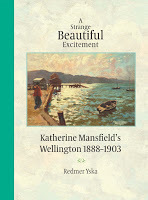
On Wednesday night, despite the weather (Wellington airport was knocked out by a lightning strike) I met up with the Tuesday Poets, Mary McCallum, who now runs a small press, Tim Jones, who also writes speculative fiction, Janis Freegard, Helen Rickerby, and Keith Westwater. We don't get much chance to see each other so it was great to catch up with what everyone was doing in a new bar called The Whistling Sister. We were all so busy chattering we forgot to take a selfie! This is one they did earlier, sadly without Janis.
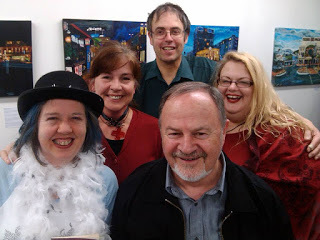 Alison Jones, Mary McCallum, Tim Jones, Keith Westwater and Helen Rickerby
Alison Jones, Mary McCallum, Tim Jones, Keith Westwater and Helen Rickerby
On Thursday, my last day, the storm blew out and the sky was blue. I had lunch at Lyall Bay with my friend Jane Tolerton who runs the fabulous Booklovers B and B and writes books. She's just published an account of the women of New Zealand who went abroad during the First World War, but whose work rarely gets a mention. Make Her Praises Heard Afar, using letters and diaries, is a very good read. She's coming to the UK in May to talk about it over there.
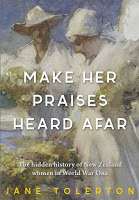
Then it was time to take the Kaitaki ferry for Picton and South Island, braving a strong swell across the Cook Strait. New Zealanders manage in short sleeves and bermudas, even at 7 degrees. I was wearing three layers of merino and my Everest assault gear - a selfie would have been just too embarrassing!
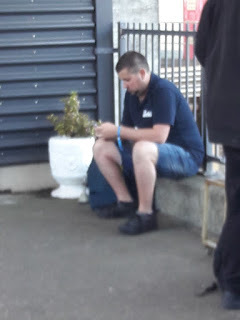
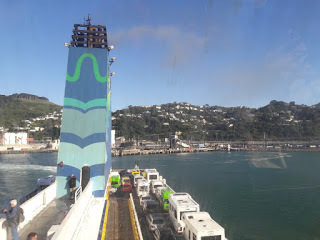 The leaving of Wellington into the clear blue.
The leaving of Wellington into the clear blue.
 One of the landslide sites under construction near KaikouraNow the road has been bulldozed out from underneath millions of tons (I'm not exaggerating) of rock and earth and is being reconstructed. Whole sections - totalling about 100 km - are being built from scratch. It's a mammoth undertaking. The mountainsides are being stabilised, but big containers are stacked up to protect road users from falling rock until it's finished.
One of the landslide sites under construction near KaikouraNow the road has been bulldozed out from underneath millions of tons (I'm not exaggerating) of rock and earth and is being reconstructed. Whole sections - totalling about 100 km - are being built from scratch. It's a mammoth undertaking. The mountainsides are being stabilised, but big containers are stacked up to protect road users from falling rock until it's finished. Containers stacked along the unfinished road. The remains of the old road can be seen just behind the fence.Out to sea the seabed has been raised by almost 15 feet in places and you can see the different colours of the rocks. The cyclone was already beginning to lash down with rain as I travelled, so it was almost impossible to take photographs through bus windows streaked with rain, but I did my best!
Containers stacked along the unfinished road. The remains of the old road can be seen just behind the fence.Out to sea the seabed has been raised by almost 15 feet in places and you can see the different colours of the rocks. The cyclone was already beginning to lash down with rain as I travelled, so it was almost impossible to take photographs through bus windows streaked with rain, but I did my best! The white rocks are newly exposed - it's a lot further to the sea these days.In Wellington, although I'm used to Southerly Busters, the wind and rain were something else. I got blown over once and soaked to the skin twice. All plans were abandoned - instead of walking the Katherine Mansfield trail I dodged in and out of coffee shops and museums. I met up with New Zealand author Redmer Yska who has just published a beautiful book on Wellington in the days when Katherine Mansfield's family were settling there. It's called 'A Strange, Beautiful Excitement' and captures the atmosphere of a newly established colonial capital perfectly - the snobbery, the corruption, the risk-taking and the stifling lives of middle class colonial wives; everything in fact that Katherine Mansfield wanted to escape from. Redmer is himself from Karori and describes the school that Katherine went to and the village, both now and then. He makes New Zealand live.
The white rocks are newly exposed - it's a lot further to the sea these days.In Wellington, although I'm used to Southerly Busters, the wind and rain were something else. I got blown over once and soaked to the skin twice. All plans were abandoned - instead of walking the Katherine Mansfield trail I dodged in and out of coffee shops and museums. I met up with New Zealand author Redmer Yska who has just published a beautiful book on Wellington in the days when Katherine Mansfield's family were settling there. It's called 'A Strange, Beautiful Excitement' and captures the atmosphere of a newly established colonial capital perfectly - the snobbery, the corruption, the risk-taking and the stifling lives of middle class colonial wives; everything in fact that Katherine Mansfield wanted to escape from. Redmer is himself from Karori and describes the school that Katherine went to and the village, both now and then. He makes New Zealand live.
On Wednesday night, despite the weather (Wellington airport was knocked out by a lightning strike) I met up with the Tuesday Poets, Mary McCallum, who now runs a small press, Tim Jones, who also writes speculative fiction, Janis Freegard, Helen Rickerby, and Keith Westwater. We don't get much chance to see each other so it was great to catch up with what everyone was doing in a new bar called The Whistling Sister. We were all so busy chattering we forgot to take a selfie! This is one they did earlier, sadly without Janis.
 Alison Jones, Mary McCallum, Tim Jones, Keith Westwater and Helen Rickerby
Alison Jones, Mary McCallum, Tim Jones, Keith Westwater and Helen RickerbyOn Thursday, my last day, the storm blew out and the sky was blue. I had lunch at Lyall Bay with my friend Jane Tolerton who runs the fabulous Booklovers B and B and writes books. She's just published an account of the women of New Zealand who went abroad during the First World War, but whose work rarely gets a mention. Make Her Praises Heard Afar, using letters and diaries, is a very good read. She's coming to the UK in May to talk about it over there.

Then it was time to take the Kaitaki ferry for Picton and South Island, braving a strong swell across the Cook Strait. New Zealanders manage in short sleeves and bermudas, even at 7 degrees. I was wearing three layers of merino and my Everest assault gear - a selfie would have been just too embarrassing!

 The leaving of Wellington into the clear blue.
The leaving of Wellington into the clear blue.
Published on April 19, 2018 02:40
April 7, 2018
Under a Different Sky
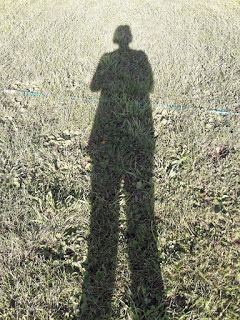 Upside down down underSo, here I am in one of my favourite home from homes, on the Canterbury Plain in South Island New Zealand - it's flat from horizon to horizon, rather like Norfolk, but with more sun. I was woken this morning, as every morning, by the musical magpies in the wattle tree outside the window. Like many New Zealand birds they are a treat to listen to. This one was a bit reluctant to sing for the camera - but finally does so at about 1 min in - definitely worth waiting for! A whole tree full of them is amazing.
Upside down down underSo, here I am in one of my favourite home from homes, on the Canterbury Plain in South Island New Zealand - it's flat from horizon to horizon, rather like Norfolk, but with more sun. I was woken this morning, as every morning, by the musical magpies in the wattle tree outside the window. Like many New Zealand birds they are a treat to listen to. This one was a bit reluctant to sing for the camera - but finally does so at about 1 min in - definitely worth waiting for! A whole tree full of them is amazing.The sun is shining today, as it has since I arrived and the sky seems to go on forever. There's a special kind of light you get here, intense and constantly changing as the clouds move across the sky. In the morning it's often still and cloudless, but towards lunchtime the white stuff begins to bubble up from the horizon and fantastic cloud formations begin to form against the blue backdrop.
It's after lunch now and the afternoon wind is talking to itself in the stove pipe and the cat has crawled under the wood-burner. It's autumn here in April, moving towards winter. The seasons are upside down.
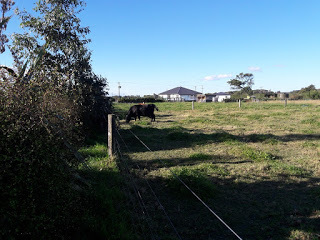 The little house on the Canterbury Plain - with Dexter
The little house on the Canterbury Plain - with DexterFor a week I've done absolutely nothing but eat and sleep. My daughter has a small 'life-style block' here and I've visited the chickens and the cows and inspected the organic veggie patch and watched the hen harriers circling the fields looking for prey. After several months of extreme stress, it has been utter bliss.
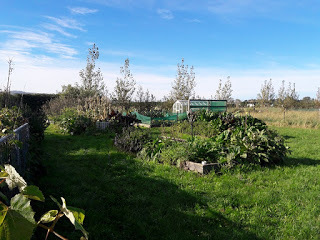 Eating organic veggies - no chance I'm going to starve!
Eating organic veggies - no chance I'm going to starve!I love south island. From where I'm sitting, I can see the Alps on the horizon, but the sea is a short drive in the other direction. The weather has been good so far - bright sun in the mornings until the afternoon wind springs up from whatever direction it has chosen. This is not a breeze! It lays the Fejoa bushes flat, pummels the windows and blows the washing off the line. And if it's blowing from the south it has the whole of Antarctica in its jaws. You can go from summer tops to thermals in the space of a couple of hours.
On Monday I'm heading for Wellington by bus and ferry. Usually I take the train, but since the Kaikoura earthquake eighteen months ago the line has been closed and the road is only open during the day. It's not just the weather that's wild here!
 My sort of wine! Roaring Meg from Mt Difficulty.
My sort of wine! Roaring Meg from Mt Difficulty.
Published on April 07, 2018 15:52
March 26, 2018
The Business of Being a Writer
I think a lot of people imagine writers spending their time at home scribbling in some quiet space, knocking back the odd bottle of wine and firing off emails to their publishers. My life, like most writers I know, does not resemble this at all (apart from the wine bit). I try to get some quiet space to scribble, but there are times when the Business of Being a Writer takes over and life becomes as manic and out of control as a bus without brakes hurtling down a mountain road!
For the past couple of weeks I've been involved in literature festivals, workshops, readings, and various other distractions as well as a lot of travelling through snowdrifts and the nightmare prospect of a year's tax returns to be sorted by April. I'm also trying to get the rights back to a couple of books that are out of print, but publishers suddenly become quite shy when faced with actually giving them back to the author, even though they have no intention of ever re-printing the book. Perhaps they're waiting to see if I suddenly become notorious? Think of the book deal they must be offering Stormy Daniels!
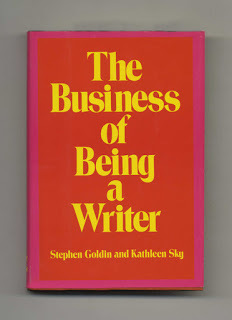 Perhaps I should buy the book that tells me how to do it?
Perhaps I should buy the book that tells me how to do it?
The literature festival, Words by the Water, was great fun. I chaired an event on the history of Fell Farming that brought back memories of my own childhood, introduced biographer Claire Tomalin for the Royal Literary Fund Lecture and interviewed two lovely novelists - Zosia Wand (Trust Me is a great read!) and Bella Pollen. I was also allowed to have my own event, talking about Haida Gwaii, and took part in a poetry reading with other poets from Write to be Counted in order to raise money for PEN. It was a lovely week talking to other writers and enjoying the wonderful views from the Theatre by the Lake in Keswick. I also managed to find time to hear the satirist John Crace who was wildly funny on both I Maybot and Jeremy Corbyn.
Crammed around the events I recorded a series of 'life stories' for BBC radio, talking about some of the weird aspects of my life and spent a day being filmed for a series about the 'Talismans' that writers have when they are writing. I talked about the Katherine Mansfield brooch that kept me writing her biography even when I thought it had no future, and the raven feathers and clam shell I found on Rose Spit on Haida Gwaii.
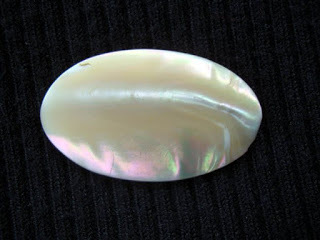 Katherine Mansfield's mother-of-pearl brooch I have now lent to a museum
Katherine Mansfield's mother-of-pearl brooch I have now lent to a museum
Last week I went to London on Wednesday to do a poetry reading with Shearsman poet Janet Sutherland, which was very enjoyable, then caught a train on Thursday morning back to the Lake District in time to drive to Dumfries to do a workshop on memoir, got back about 11pm to catch a few hours sleep before getting up to print material for my reading round group on Friday morning. I've spent the weekend trying to finish a freelance project before I go off to New Zealand, via Frankfurt and Singapore, tomorrow morning. Feeling tired yet? I certainly am!
This is a Writer's Life - crazy, busy, full of things you have to do to earn money, or publicise your work, or simply meet other authors for a bit of mutual empathy. Oh, and then there's the accounts! But never mind, I leave at 7am tomorrow morning for the warm south and a few weeks of off-grid thinking time. I'm really looking forward to seeing my daughter again and my two little grandsons. It is worth spending two days in an airline seat or hanging around airports just to get there. And then there's New Zealand coffee, and - of course - the wine!
For the past couple of weeks I've been involved in literature festivals, workshops, readings, and various other distractions as well as a lot of travelling through snowdrifts and the nightmare prospect of a year's tax returns to be sorted by April. I'm also trying to get the rights back to a couple of books that are out of print, but publishers suddenly become quite shy when faced with actually giving them back to the author, even though they have no intention of ever re-printing the book. Perhaps they're waiting to see if I suddenly become notorious? Think of the book deal they must be offering Stormy Daniels!
 Perhaps I should buy the book that tells me how to do it?
Perhaps I should buy the book that tells me how to do it?The literature festival, Words by the Water, was great fun. I chaired an event on the history of Fell Farming that brought back memories of my own childhood, introduced biographer Claire Tomalin for the Royal Literary Fund Lecture and interviewed two lovely novelists - Zosia Wand (Trust Me is a great read!) and Bella Pollen. I was also allowed to have my own event, talking about Haida Gwaii, and took part in a poetry reading with other poets from Write to be Counted in order to raise money for PEN. It was a lovely week talking to other writers and enjoying the wonderful views from the Theatre by the Lake in Keswick. I also managed to find time to hear the satirist John Crace who was wildly funny on both I Maybot and Jeremy Corbyn.
Crammed around the events I recorded a series of 'life stories' for BBC radio, talking about some of the weird aspects of my life and spent a day being filmed for a series about the 'Talismans' that writers have when they are writing. I talked about the Katherine Mansfield brooch that kept me writing her biography even when I thought it had no future, and the raven feathers and clam shell I found on Rose Spit on Haida Gwaii.
 Katherine Mansfield's mother-of-pearl brooch I have now lent to a museum
Katherine Mansfield's mother-of-pearl brooch I have now lent to a museumLast week I went to London on Wednesday to do a poetry reading with Shearsman poet Janet Sutherland, which was very enjoyable, then caught a train on Thursday morning back to the Lake District in time to drive to Dumfries to do a workshop on memoir, got back about 11pm to catch a few hours sleep before getting up to print material for my reading round group on Friday morning. I've spent the weekend trying to finish a freelance project before I go off to New Zealand, via Frankfurt and Singapore, tomorrow morning. Feeling tired yet? I certainly am!
This is a Writer's Life - crazy, busy, full of things you have to do to earn money, or publicise your work, or simply meet other authors for a bit of mutual empathy. Oh, and then there's the accounts! But never mind, I leave at 7am tomorrow morning for the warm south and a few weeks of off-grid thinking time. I'm really looking forward to seeing my daughter again and my two little grandsons. It is worth spending two days in an airline seat or hanging around airports just to get there. And then there's New Zealand coffee, and - of course - the wine!
Published on March 26, 2018 13:56
March 19, 2018
The Poetry Society Cafe - The Rainmaker's Wife, Bone Monkey and other Birds and Beasts
Life is more than hectic - it seems to be a kind of survival game at the moment - some wonderful events and workshops, but it's beginning to feel as if I'm running a kind of literary marathon!
Wednesday, it's down to London on the Virgin express (snow permitting!) and the Poetry Society Cafe for a reading with the wonderful Janet Sutherland. We're both reading from our current collections - I'm launching the Rainmaker's Wife and Janet is previewing her work in progress as well as reading from Bone Monkey. There is wine and food in the cafe and good poetry in the basement! Do come if you're in London - the event is free and there's an open mic slot.
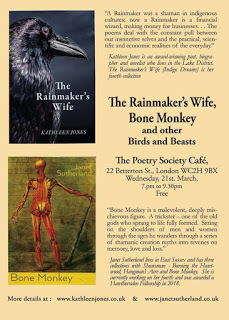
Wednesday, it's down to London on the Virgin express (snow permitting!) and the Poetry Society Cafe for a reading with the wonderful Janet Sutherland. We're both reading from our current collections - I'm launching the Rainmaker's Wife and Janet is previewing her work in progress as well as reading from Bone Monkey. There is wine and food in the cafe and good poetry in the basement! Do come if you're in London - the event is free and there's an open mic slot.

Published on March 19, 2018 12:20



